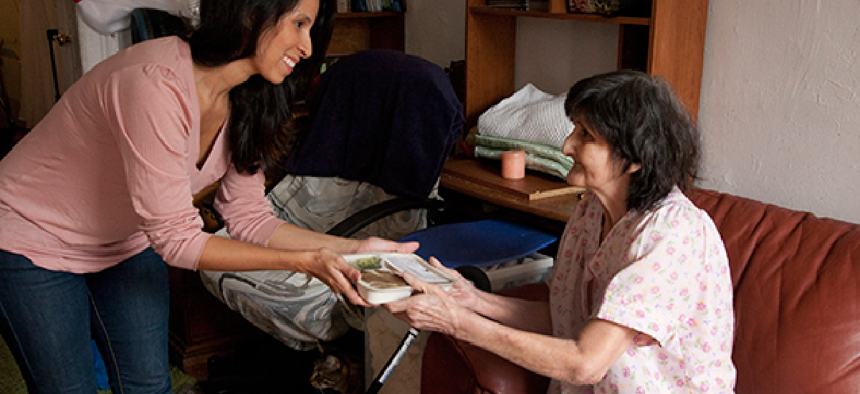Agency of the Month: Citymeals-on-Wheels

Much has been written about the “graying of America,” and New York City is certainly not immune to this phenomenon. Currently, 1.4 million of the city’s inhabitants are senior citizens (age 60 and older), and with some experts anticipating as much as a 45 percent increase in that number over the next decade, city and nonprofit agencies are intent on keeping up with the growing demand for services.
Given this reality, Citymeals-on-Wheels, an organization that delivers millions of meals a year, provides an increasingly essential lifeline for homebound elderly New Yorkers.
“The people we serve are the people who built New York,” said Citymeals-on-Wheels Executive Director Beth Shapiro. “They are the fabric of our city, from every ethnic background that you can think of.”
Citymeals-on-Wheels’ clients are among the city’s most vulnerable citizens: 73 percent live alone, 40 percent rarely leave their homes and 8 percent have no one to talk to other than the volunteers who deliver their meals.
The organization was founded in 1981 when Gael Greene, a New York restaurant critic, read that homebound seniors were not receiving essential meal deliveries on the weekends or holidays due to gaps in government funding. Greene mobilized her friends, including the renowned chef James Beard, to raise money specifically for meals for the elderly. After collecting $35,000, Greene approached the city’s Department for the Aging and as a result, 6,000 meals were provided to homebound elderly over the Christmas holiday.
What began as a single donation has blossomed into a long-standing partnership between Citymeals-on-Wheels and the Department for the Aging. Today, the two form a public-private partnership wherein Citymeals-on-Wheels funds and provides support for weekend, holiday and emergency deliveries for department meal programs, tallying an impressive 2 million meals for 18,000 seniors each year.
Shapiro says this partnership is not just about helping those in need; it’s also a cost-effective approach. In partnering with Citymeals-on-Wheels, the Department for the Aging is able to take advantage of the federal government’s “cash in lieu of commodities” program, which reimburses the city 67 cents for every meal underwritten by the organization.
“The city gives $1.8 million for these meals and gets $1.4 million back from the federal government,” Shapiro said.
This is just one of the ways, Shapiro explains, that Citymeals-on-Wheels serves a city that must find holistic solutions to serving its elderly population.
“It is critical and cost-beneficial for us to find ways for these people to stay in their homes, as the cost of delivering meals is so much lower than the alternatives that exist for this population,” Shapiro explained.
The organization’s meal delivery model gives it the unique ability to reach seniors with innovative programming, such as an initiative to bring case managers into the homes of clients in an effort to sign up eligible seniors for SNAP benefits. Citymeals-on-Wheels also provides fresh local produce to clients during the spring and summer months—not only a treat, but essential nutrition for a population that has very limited access to fruit and vegetables.
In fact, many of Citymeals-on-Wheels’ initiatives are tailored to the seasons, as both winter and summer provide unique challenges to food-insecure elderly clients.
“In the fall, we deliver 20 pounds of shelf-stable food as a precaution against winter emergencies,” Shapiro said. “In many cases, a storm will hit and our clients cannot even make it to a corner grocery to get food. During the July Fourth holiday, we provide our clients with extra water so that they can stay hydrated through the summer months.”
But perhaps the most meaningful service that the organization provides, Shapiro says, is a human connection for a population desperately in need of companionship.
“Our volunteers are in the unique position of being able to add companionship to someone’s life, which goes a long way towards staving off depression,” Shapiro said. “It’s easy to forget, but many of our clients have outlived spouses, and sometimes their own children. We need to make sure they have that connection.”
In some cases, just showing up at the door can be life changing.
“In one case, a Citymeals volunteer checked up one of our recipients right after Hurricane Sandy,” Shapiro said. “It turned out that she had fallen on the other side of the door and broken her hip. Our volunteer was able to get her immediate help.”
Shapiro says that in many cases, Citymeals volunteers spend more time with recipients than anyone else in the seniors’ lives. For this reason, Citymeals-on-wheels trains its volunteers to work with clients who have Alzheimer’s and dementia, as well as to detect signs of elder abuse and depression.
“I like to say that the meal delivery is nourishing the body and the knock on the door is nourishing the soul,” Shapiro said.